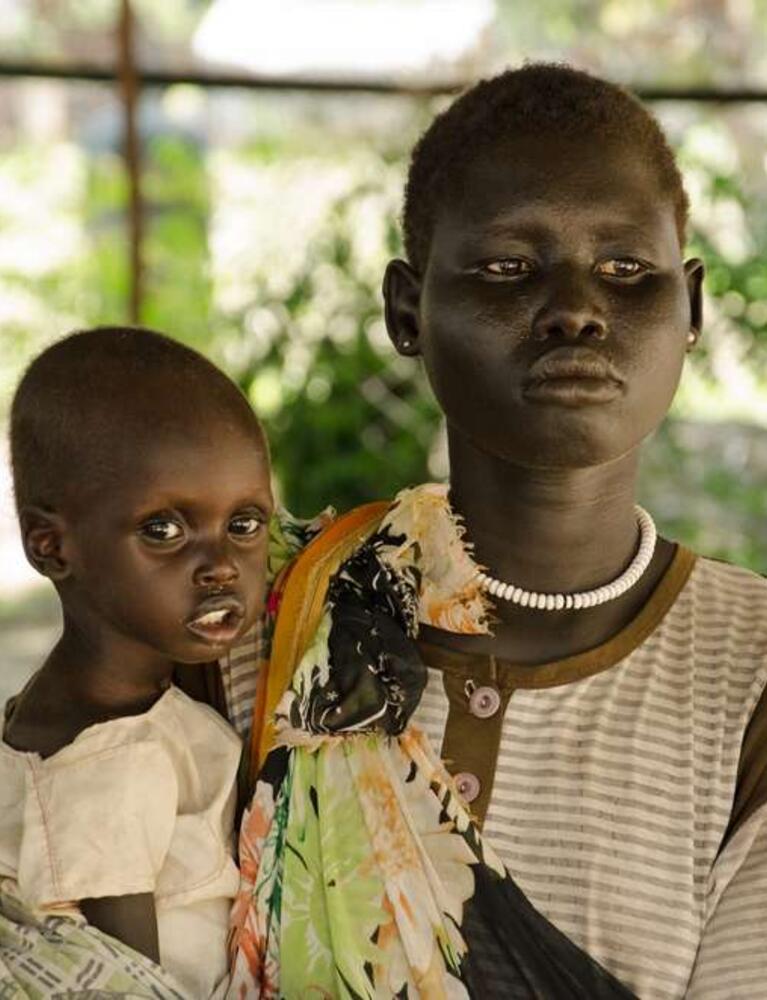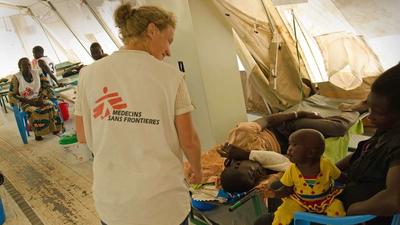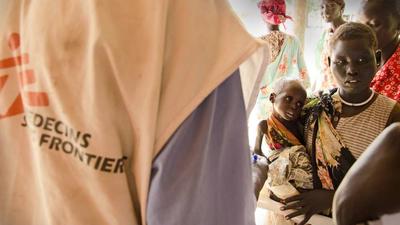Alarming malnutrition rates are being recorded in parts of South Sudan. In Leer, a town nestled in the swampy marshlands that surround the White Nile river, Médecins Sans Frontières/Doctors Without Borders (MSF) is seeing this problem first hand.
“Before the conflict, we used to have around 200 children admitted into the ambulatory therapeutic feeding centre (ATFC) at any one time,” says Grace Ayuelu medical team leader in Leer. She has been working in Leer hospital for almost a year. “But now, we have over 1,800 children. That is a big number.”
Fleeing conflict
Much has contributed to this situation. After the conflict that erupted in South Sudan in mid-December 2013, many people’s houses in Leer, as well as the MSF hospital, were looted and razed to the ground.
To escape the conflict people fled into the bush, going months without anything to eat other than wild roots and whatever else could be gathered from the land.
Now, with people returning to Leer, the partially destroyed MSF hospital is up and running again albeit at half the capacity.
Ambulatory feeding
Today, the busiest area of Leer hospital is the ATFC. Here, children under five-years-old are brought to the hospital to assess their level of nutrition.
Taking measurements of their height, weight and mid-upper arm circumferences (MUAC) the majority of children who come through the ATFC are found to be moderately malnourished.
“In these cases,” says Grace, “they are sent home with a week’s supply of a ready-to-use therapeutic food called Plumpy’Nut, a peanut-based paste, and come back every week to be reassessed until they are back to normal health.”
Treating malnutrition
If children are severely malnourished, they have to be admitted into the intensive therapeutic feeding centre. Here, their feeding can be closely monitored and drugs can be prescribed to combat any other complications that can be a factor in recovering from malnutrition.
This was the case with two-year-old Gatluok…
More
- Interview: Hear from MSF's staff in Leer hospital who were evacuated and fled into the bush when the conflict arrived in January
- Press release: Child malnutrition rates skyrocket
Photostory
Carrying her son, 25-year-old mum Angelina arrives at MSF’s hospital in Leer, Unity state, South Sudan.
After walking five hours from her home village, Angelina spends little time waiting to be seen as MSF’s doctor, John Yonk Both, recognises that Gatluok’s condition is critical.
Before his consultation, Gatluok’s measurements are taken. The suspended baby scale shows that he weighs just 5.7 kg. The weight of a healthy boy his age should be 14 kg.
Gently lowered onto a measuring board he finds the situation distressing, like most children who go through this process. His height is recorded at 78 cm.
MSF nutrition nurse Charles Mpona Kalinde tries to comfort him as he, very carefully, carries Gatluok back to his mother after his measurements are taken.
He is then given the all-important MUAC test. His MUAC measures just 94 mm, well within the red area, indicating that he has severe acute malnutrition.
Gatluok and his mum are given a moment to recover after the measurements are taken. He reaches for the hand of an MSF clinic officer.
Gatluok is then taken for his consultation with MSF nurse Peter Bitoang Machar. Gatluok’s mum tells Peter of their situation at home, how her house was burned and their food stocks were looted, and how they had to flee into the bush.
During the consultation, Peter tests Gatluok’s appetite with some Plumpy’Nut. But, he won’t eat. Peter carries out another test and establishes that Gatluok has malaria and a high fever.
Despite being unwilling to eat, he is incredibly thirsty and eagerly drinks a rehydration solution.
Within half an hour of arriving, Gatluok is admitted into MSF’s intensive therapeutic feeding centre. But it will not be easy. His mum has no food at home and is also worried about her other child, who she had to leave behind in the care of her brother.
Now, one week after Gatluok was admitted, he has recovered from malaria and he has started eating again. It is hoped that within the coming days Gatluok will be discharged and will be followed up in the ATFC.
MSF in Leer, South Sudan
There are over 207 MSF staff from South Sudan and beyond currently working in Leer, providing emergency nutrition and outpatient care to the population. The MSF project in Leer also accounts for two other ambulatory therapeutic feeding centres in southern Unity state, one in Nyal and another in Mayendit.
Before its hospital was destroyed at the end of January, MSF had been working in Leer for the past 25 years, providing both in- and out-patient care for children and adults, surgery, maternity, HIV/TB treatment, and intensive care. The hospital was the only fully functioning secondary facility in all of southern Unity State, serving 270,000 people






